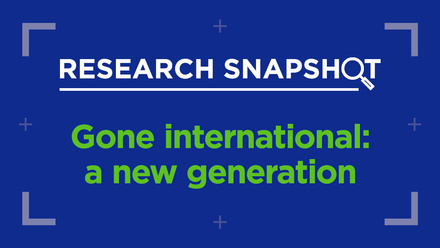MSCA-funded support for researchers at risk: useful resources

The past decade has clearly demonstrated the need for shared responsibility among countries, regions, institutions and individuals to address the escalating societal challenges we all face. One of these challenges is the continuing attack on academic communities worldwide in the form of threats to academic freedom and freedom of scientific research, which apart from threatening intellectual heritage of a country or region, leave highly educated talent without a personal or professional refuge.
Since the so-called ‘refugee crisis’ of 2015, the European Commission has worked on developing and providing measures to respond to the needs of displaced students and scholars by helping them continue along their academic paths and easing their transition in the midst of new socio-cultural realities. This work has been reinforced in the current EU programming period (2021–2027) as concerns about threats to academic freedom continue to grow across and beyond the higher education and research communities.
A number of initiatives at EU level are dealing with this complex and multifaceted challenge in an attempt to bring together the relevant aspects of education, research, migration, humanitarian aid and the rule of law. The European Research Area’s Bonn Declaration on the freedom of scientific research (20 October 2020) and the European Higher Education Area’s Rome Ministerial Communiqué (19 November 2020), are a joint starting point to safeguarding and enhancing freedom of science and academic freedom. Fundamental values are also a key priority in the European Strategy for Universities, adopted by the Commission in January 2022, and the ERA Policy Agenda.
Inspired resources
Since 2019, the Marie Skłodowska-Curie Actions (MSCA) programme – which supports training and career development of researchers from all over the world at any stage of their career – has provided project grants for consortia with active networks and expertise to provide guidance and assistance to researchers whose lives, freedom and careers are in danger. This work started with the ten-partner Inspireurope project, which has facilitated transnational cooperation across Europe to support researchers at risk through awareness-raising activities, training and guidance for researchers, peer learning and networking for support organisations, and recommendations for further work. Following successful implementation of this project, its successor Inspireurope+ started in September 2022 and will last until August 2025.
"Do not underestimate the importance of your help."
Inspireurope has developed a number of highly useful resources and reports that can serve as guidance and inspiration for institutions and organisations looking to develop or enhance their work on supporting at-risk scholars. These resources can also serve as good orientation for higher education leaders and national and European policymakers looking to work with support organisations or support individual researchers directly. They include:
• Researchers at Risk: National-level actions in Europe, a report which features interviews with staff of national-level organisations dedicated to supporting researchers at risk across Europe
• Researchers at Risk: Mapping Europe’s Support, a report which provides an overview of available support for researchers at risk – information on different initiatives, national/EU projects or structures
• Policy Recommendations, a report for higher education institutions’ leaders and policymakers at national and European level
The project has enabled coordination and peer learning between national and European stakeholders, by establishing a competent and well-organised entry point for action. Its successor project will take into consideration new challenges for researchers at risk – such as the consequences of the COVID-19 pandemic, the political upheaval in Afghanistan or the war in Ukraine – and continue looking into private sector career opportunities for researchers at risk and the obstacles private companies face in employing them.
In addition to these project reports, interested individuals and organisations can consult the MSCA Guidelines for Inclusion of Researchers at Risk. These guidelines give a background on researchers at risk – definition, reasons for being at risk, the threats they face, as well as a set of recommended practices on how to include researchers at risk in research projects. Although the MSCA Guidelines primarily serve as an encouragement for MSCA-funded projects, the recommendations are equally applicable and useable for any organisation interested to involve researchers at risk in their project, as they feature examples of good practice which can serve as an inspiration.
The latest EU-level initiative in support of researchers at risk is a Preparatory Action on a European fellowship scheme for researchers at risk. This pilot initiative is to develop a suitable structure for a fellowship scheme for researchers at risk that would address the currently fragmented and limited support at EU level. On top of developing procedures to assess the levels and types of risks, excellence of the proposals and selection criteria, the scheme will allow for awarding around 30 fellowships for researchers at risk to continue their work in a safe environment, academic or non-academic. The call for proposals is open until 7 September.
MSCA4Ukraine
The experience and work in Inspireurope were an invaluable asset in responding to the needs of the Ukrainian academic community in early 2022. With unprecedented swiftness, both the Commission and the implementing consortium composed of the organisations that took part in Inspireurope developed a fellowship scheme (MSCA4Ukraine) to respond to the needs of researchers fleeing Ukraine. The €25m grant under the MSCA funds fellowships for scientists from Ukraine to continue their research in academic or non-academic organisations established in EU Member States or Horizon Europe Associated Countries, until a safe return home is possible. Support is also provided to researchers’ families, as well as additional inclusion allowances, where applicable.
The response to MSCA4Ukraine was immense, with more than 400 applications submitted by the deadline in November 2022. The scheme will fund 124 fellowships. Out of the 21 participating host countries, the majority of applicant host organisations are based in Germany and the Czech Republic. The first fellowships have begun in March/April 2023. More information is available on the project page.
In conclusion, in the words of someone well placed to speak on behalf of one of the supported researcher groups, we quote Dr Maryna Shevtsova, who is an MSCA fellow, Fulbright scholar, national coordinator of ScienceForUkraine in Slovenia and a researcher on inclusion, gender, LGBTI+ politics:
"Do not underestimate the importance of your help. You might think you did not do anything special but sometimes one call or a message sent are enough to change someone’s destiny or give someone hope. Two months ago, a friend of mine ‘just’ forwarded a message from an Austrian colleague to me, and I ‘just’ put this colleague in contact with my friend-activist in the Ukraine. As a result, money was collected to provide food and shelter for 30 displaced LGBTI Ukrainians for a month."Register for #EAIE2023






